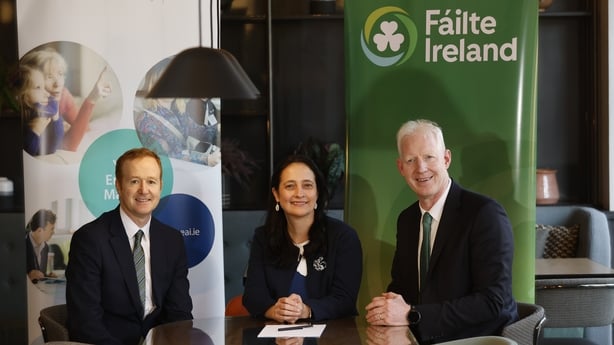The use of hotel accommodation for refugee and asylum seekers is having a significant impact on the tourism industry, according to Fáilte Ireland.
"Our research showed that about 12% of registered tourism accommodation has been withdrawn for humanitarian reasons," said Paul Kelly, CEO of the tourism body.
"We estimate that between €750m and €1.1 billion is lost to the Irish economy, which would be about €200m is tax revenue as well, because of the use of that accommodation," he added.
He told Morning Ireland that the industry would like to see alternative solutions found "as quickly as possible".
The riots in Dublin in November saw Fáilte Ireland pause a marketing campaign - "Winter in Dublin, it's magic".
The chaotic scenes in the capital got significant media coverage worldwide, but Mr Kelly said it does not seem to have dampened the appeal of Ireland internationally.
"If there are repeat incidences that would be a different factor, but as a once off, it doesn't seem to have had a long term impact," he said.
"Most businesses are predicting that international visitors are going to be up on last year, which is great to see the recovery continue. And we're facing into our best year ever in terms of air access. Overall from a demand point of view, particularly from the North American market, it's looking very strong for this year."
We need your consent to load this rte-player contentWe use rte-player to manage extra content that can set cookies on your device and collect data about your activity. Please review their details and accept them to load the content.Manage Preferences
Fáilte Ireland today announced plans for 2024 which focus on the sustainable development of the tourism industry.
It has entered into a Memorandum of Understanding with the Sustainable Energy Authority of Ireland.
It said the partnership will ensure tourism businesses can easily access the financial supports available to reduce carbon emissions, increase energy efficiency and adopt renewable technologies.
"Fáilte Ireland remains committed to supporting tourism businesses to manage these challenges as well as focusing on the biggest long-term challenge for us all - climate change. We can see very clear and significant opportunities to decarbonise tourism businesses across Ireland, and this will be a key focus for us in the year ahead."
Central to the plans is a new Climate Action Programme, developed in consultation with tourism businesses, which includes the appointment of a dedicated advisor to businesses to help navigate every step of the climate action journey.

CEO of SEAI William Walsh said the new Memorandum of Understanding will help SEAI and Fáilte Ireland "raise awareness of supports that are available to enable the tourism sector to deliver national climate action targets, reduce carbon emissions and replace fossil fuels systems across all activities."
The tourism body will also celebrate the 10th anniversary of its first regional tourism brand the Wild Atlantic Way in 2024.
To continue to motivate visitors to take a domestic break in Ireland and encourage overseas visitors to choose Ireland as a destination, Fáilte Ireland updated the industry on its future potential pipeline of up to 150 new or upgraded tourism projects that may be developed across its four regional brands.
Eight of these new visitor attractions and experiences are due to open in 2024 including Queen Maeve Square in Sligo, a new water sports facility in Curracloe, Wexford, Dublin Castle Records Tower in Dublin city centre and Connaught Harbour in Portumna, Galway.


